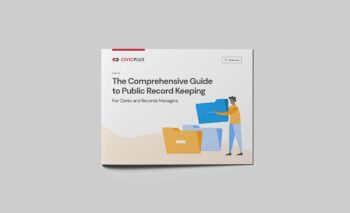FOIA Request vs. Records Request: Is There a Difference?
Is there a difference between a FOIA request and a records request? Not really. The idea is all the same. All public agencies are required by law to retain certain records, like internal emails, invoices, social media posts, and more. Learn more about what constitutes a public record here. Public agencies are also required to release these upon request.
The Freedom of Information Act, or FOIA, requires the federal government to retain and release records when requested. So, a federal records request could be called a FOIA request. Laws similar to FOIA have been passed in every state and the District of Columbia; some have the same name, but not all are called FOIA.
State Records Laws
Laws have different names in different states. They are sometimes called “right to know” or “sunshine” laws, but the most common names are Public or Open Records Laws or Acts. States require public agencies to retain official government business records, regardless of the records’ physical form, and records laws require them to fulfill requests from the public or the press for copies of these records.
Specifics vary. Each state’s law outlines what information is exempt, like personal medical information or juvenile court records. Some states may specify the time an agency has to respond, while others do not. How records may be used is also sometimes defined by state law. However, all 50 states have public records laws that allow people to request information from public agencies.
Public Records Law or Act
This is the most common name for this type of law, and slight variations of it appear in the laws of 19 states. Because of this, we often talk about information requests as “public records requests” or “records requests” in NextRequest’s online content. But what you call a request for information from a public agency usually depends on what state you live and work in.
- Alabama
- Alaska
- Arizona
- California
- Idaho
- Indiana (Access to Public Records Law)
- Louisiana
- Maryland (Public Information Act)
- Massachusetts
- Mississippi
- Montana
- Nebraska
- Nevada
- North Carolina
- Oregon
- Rhode Island (Access to Public Records Act)
- Texas (Public Information Act)
- Vermont
- Washington
Open Records Law, Act, or Statute
This is another common name seen in the laws of ten states. Check the list below to see if your state uses this terminology.
- Georgia
- Iowa
- Kansas
- Kentucky
- New Jersey (Open Public Records Act, or “OPRA”)
- North Dakota
- Ohio
- Oklahoma
- Tennessee
- Wisconsin
Freedom of Information (FOIA)
After the federal law, many states have named their records laws the Freedom of Information Act, or “FOIA.” These states usually refer to requests for records as “FOIA requests.” The following states have Freedom of Information Acts or Laws.
- Arkansas
- Connecticut
- District of Columbia
- Delaware
- Illinois
- Maine (Freedom of Access Act)
- Michigan
- New York (Freedom of Information Law)
- South Carolina
- Virginia
- West Virginia
Sunshine Law
Some states chose a cheerful name for their records rules: Sunshine Laws! The idea is that government in the sunshine is open, transparent government. This name also inspired Sunshine Week, highlighting the importance of access to public information.
- Colorado
- Florida
- Missouri
- South Dakota
- Wyoming
Other Names
A handful of states go their own ways, not following any of the naming conventions for records laws.
- Hawaii: Uniform Information Practices Act
- Minnesota: Data Practices Act
- New Hampshire and Pennsylvania: Right to Know Law
- New Mexico: Inspection of Public Records Act
- Utah: Government Records Access and Management Act
How Requirements Vary
Time to Respond
The time an agency has to respond to a request is specified in some states’ laws and not others. California gives agencies ten days to respond, while Iowa gives more wiggle room at 10 to 20 days. Other states, like Alabama, do not give a deadline for response. It doesn’t mean that agencies in these states can delay their response indefinitely, but it does give them more flexibility.
Specified Use
State records laws do not require a statement of purpose to be submitted with the request. However, some laws limit how records may be used or allow agencies to charge fees for specific uses.
Some laws say that records cannot be used for specific commercial purposes or that fees may be charged in commercial cases. For instance, Oklahoma charges fees for commercial use of records, and New Mexico does not allow police records to solicit victims for services.
New Hampshire requires that requestors specify that they are making a research request if they are requesting statistical data sets. Otherwise, they do not need a statement of purpose.
Some state laws may allow agencies to reject requests that interfere with public work, like Illinois, or for representing an undue burden including Kansas and Kentucky. What constitutes interference or an undue burden is not specified.
Metadata
In Arizona, metadata, or embedded data that is part of web pages and helps authenticate their contents, are part of digital records and are subject to open records requests. They can also be considered a record in North Carolina; the state provides guidance on storage and management.
The metadata storage can be necessary for compliance with digital records, including on government and school social media pages. Learn more about why archiving social media and its metadata is essential here.
Exemptions
All states exempt certain records or information types from their records laws. Most states cannot fulfill records requests for ongoing police investigations, personal medical records, or proprietary business information.
They also cannot release personal identifying information, like social security numbers or credit cards. If this information appears in a record that has been requested, the public agency will likely redact that information from the record. Redaction is part of most records request fulfillment, as government business often involves the private citizens it serves.
Redaction can be time-consuming for public employees fulfilling records requests, especially when the request is broad and includes many documents. Learn more about how NextRequest’s RapidReview tool provides bulk redaction, redacting hundreds of documents simultaneously.
Fees
Some agencies charge fees for requests, and the rates are usually determined by each agency individually. Rates are rarely specified by state law. Agencies usually estimate how many hours a request would take them to fulfill and charge based on that estimate. Read more about records requests fees here.
Want more specifics on the records laws of each state? Learn more from the National Freedom of Information Coalition.
FOIA Request or Records Request
No matter what your state calls them, FOIA and records requests are protected under law in the US. And we’ve seen in recent years that people are exercising this right more than ever, with many public agencies and schools seeing massive increases in requests. If this sounds familiar to your agency or school, implementing a request management software solution can help you save significant time and reduce costs related to managing and fulfilling records requests. NextRequest’s solution streamlines workflows for better collaboration and faster response times. It also has an industry-leading redaction tool with auto-save, proper draft, and bulk redaction. Contact us today to learn more.



